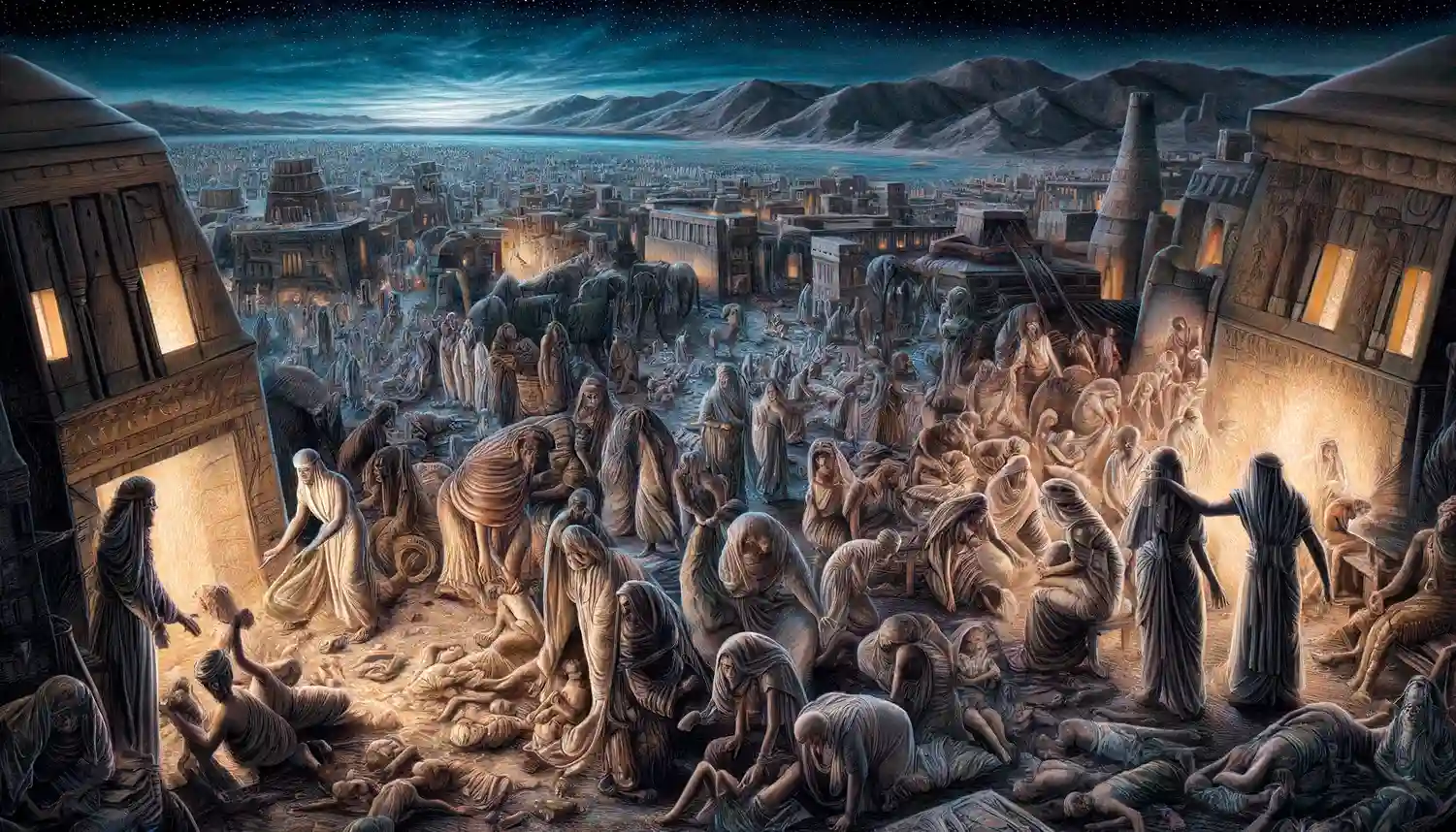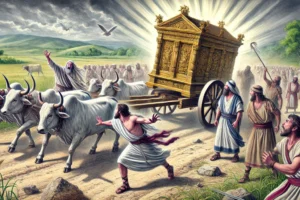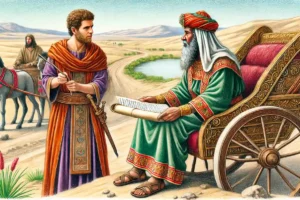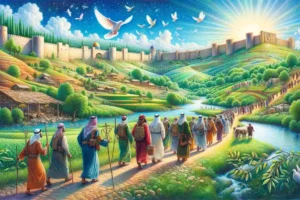
Death of Egyptian Firstborns
The passage from Exodus 12:29-30 recounts the climax of the ten plagues that God inflicted upon Egypt, which is the death of the firstborns. This event is pivotal in the biblical narrative of the Exodus, marking the decisive act that finally compels Pharaoh to release the Israelites from bondage. Here are some key facts about this event:
- Divine Judgment: The death of the firstborn is described as a judgment specifically executed by God. It is depicted as a direct action from the Lord, passing through Egypt to strike down all the firstborn of both people and animals.
- Distinction of the Israelites: God instructs the Israelites to mark the doorposts of their homes with the blood of a lamb, a sign for God to “pass over” their homes and spare them from this plague. This act of marking the doorposts is foundational to the Jewish observance of Passover.
- Universal Impact: The plague affects all Egyptian households, from the royal family to the prisoners in the dungeons, along with their livestock. This universality emphasizes the total and overwhelming nature of divine intervention.
- Timing: This event occurs at midnight, enhancing the dramatic and sudden nature of the judgment.
- Immediate Effect: The immediate aftermath is profound mourning throughout Egypt, with not a single Egyptian household left untouched. The severity of the impact is such that it breaks Pharaoh’s resistance, leading him to urgently send the Israelites away.
- Theological Significance: Theologically, this event signifies God’s protection and deliverance of His chosen people. It also establishes God’s power and judgment, contrasting the impotence of the Egyptian gods.
- Historical and Cultural Context: The event underscores the themes of liberation and divine justice. It has been interpreted in various ways through theological, historical, and literary lenses, reflecting on the nature of suffering, the concept of justice, and the sovereignty of God.
The death of the Egyptian firstborns, as recounted in Exodus 12:29-30, serves multiple theological, symbolic, and narrative purposes within the broader context of the Exodus story. This event is not merely a historical recount but is laden with deep theological meanings and implications for both the ancient Israelites and subsequent generations of believers.
Theological Significance
- Divine Sovereignty and Power: The tenth plague is a definitive demonstration of God’s sovereignty over all nations and their gods. In the ancient Near Eastern context, where deities were often linked to specific geographical areas and aspects of life, the Lord’s intervention in Egypt was a direct challenge to the Egyptian gods, including Pharaoh himself, who was considered divine.
- Justice and Retribution: The plague can be seen as an act of divine justice. The Egyptians had subjected the Israelites to harsh slavery and had decreed the death of all Hebrew male infants. The death of the firstborns might be viewed as a measure-for-measure response, underscoring the biblical theme of divine retribution according to the principle of lex talionis, or the law of retaliation.
- Covenantal Faithfulness: God’s actions in Egypt reaffirm His covenant with Abraham, Isaac, and Jacob to make their descendants a great nation and to deliver them to a promised land. The plagues, culminating in the death of the firstborns, are part of God’s faithful execution of this promise.
Symbolic Meanings
- The Passover Lamb: The requirement for the Israelites to mark their doorposts with the blood of a slaughtered lamb symbolizes salvation and deliverance. This act prefigures the Christian theological interpretation of Jesus Christ as the Lamb of God, whose sacrifice delivers believers from spiritual bondage and death.
- Initiation of Passover: This event establishes the Passover, one of the most significant religious observances for Jews. It is a time of remembering God’s deliverance and a ritual reenactment of that historical liberation.
Narrative and Literary Analysis
- Dramatic Climax: Structurally, the death of the firstborn represents the climax of the conflict between God and Pharaoh. This moment of intense drama not only serves to break Pharaoh’s resistance but also marks a turning point in the narrative arc from oppression to liberation.
- Theme of Liberation: The Exodus story, centered on themes of liberation and freedom, serves as a powerful narrative that has resonated throughout Jewish and Christian histories. It symbolizes the eternal struggle against oppression and the hope for divine intervention.
- Historical Memory and Identity: For the Israelite community, the recounting of this event serves to strengthen communal identity and historical continuity. It is a pivotal event that defines the nation’s beginnings and God’s role in its history.
In conclusion, the death of the Egyptian firstborns in Exodus 12:29-30 is rich with theological, symbolic, and narrative depth. It encapsulates key themes of divine justice, salvation, and deliverance, serving as a foundational moment in the religious consciousness of the Israelite people and influencing subsequent theological reflections in Christianity.



